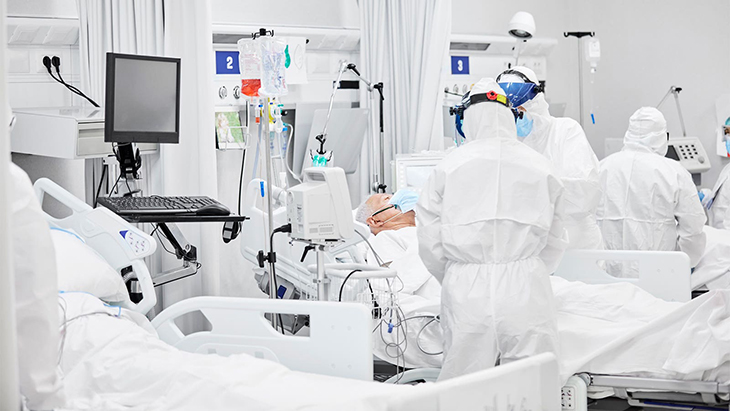
Respiratory syncytial virus (RSV) oftentimes hits young children. These days, however, more people aged 65 and up have getting hit this season. Getting sick with RSV may worsen other illnesses such as asthma, chronic obstructive pulmonary disease, and congestive heart failure.
Cases of RSV (respiratory syncytial virus) and other respiratory illnesses have increased all throughout the United States. Recent headlines have spoken about this and they honed in on how children infected with RSV have been rushed to the hospitals and the rooms have been filled to capacity. Right now, older adults are also being rushed at a rate that is unusually high. They compared the figures with the previous years and have been alarmed with the increase.
As of November 5, 2022 the data that came from the Centers for Disease Control and Prevention (CDC), it shows that seniors aged 65 and older diagnosed RSV are now being rushed to hospitals weekly at a rate of 1.6 per 100,000. Since the years 2014–2015, the data shows that this rate had gone up beyond 1 per 100,000. In 2018 at around the same time, seniors suffering from RSV were being rushed at a low 0.2 per 100,000, which is 8 times lower than the rate they have at the moment.
Despite the figures, young children are still the ones most affected by it. Among infants aged 0 to 6 months, 145.2 per 100,000 are rushed to the hospitals weekly, according to latest federal government numbers. For those 6 to 12 months with RSV, the rate is 63 per 100,000.
The Yolo County Health Department in California gave out a warning and said that RSV can be serious, especially in babies and in older adults, as this brings about pneumonia (lung infection) and bronchiolitis (inflammation of the small airways found in the lungs).
RSV aggravates asthma, chronic obstructive pulmonary disease (COPD), and congestive heart failure.
Every year, experts have estimated that between 60,000 to 120,000 older adults in the U.S. are hospitalized and 6,000 to 10,000 of them die from infections brought about by RSV, according to the CDC. The ones who are extremely at risk are the ones aged 65 or older or those who suffer from chronic heart or lung disease or those whose immune systems aren’t as strong.
RSV – Part of a Triple Viral Health Threat
To make the situation even tougher, influenza and COVID-19 infections have been on the rise as well— making this a triple threat of viruses found all over the world.
“We are seeing higher than usual influenza and RSV activity for this time of year,” said Yolo County Health Officer Aimee Sisson, MD, in a statement. “We are also seeing an increase in COVID-19 cases.”
Although no vaccines are available, researchers are working hard to produce one and some trials have seen optimistic results. Highly effective inoculations for flu and COVID-19, however, are there, and health authorities are still pushing people to get vaxxed.
“The U.S. is currently facing its highest flu hospitalization rate in a decade, with young children and seniors most at risk,” said Same Vohra, MD. She is the director of the Illinois Department of Public Health. She recently spoke in a press release. “Vaccines remain our best tools to prevent the worst outcomes from COVID-19 and flu. I strongly recommend all that have not gotten full protection from COVID-19 and the flu to get vaccinated right away. Both the new COVID-19 bivalent booster and the flu shot target the current strains of these viruses.”
Taking More Care This Season
While vaccinations have extra protection, you can still get hit with these viruses. Hence, people are advised to take extra precautions, especially during the fall and winter seasons where these viruses hit people most. For extra protection against RSV and other respiratory ailments, people are advised to:
- Wash hands often using soap and water. They need to do this for at least 20 seconds. If faucets aren’t there, use alcohol or an alcohol-based sanitizer.
- Do not tough eyes, nose, and mouth without washing because this is how germs spread.
- Avoid close contact. This means that you need to limit kissing and drinks or eating from the same set utensils with others who have a cold.
- Cover mouth and nose when you cough or sneeze.
- Clean and disinfect surfaces and objects that are often touched. Examples of these are toys, doorknobs, and mobile devices. Those infected with RSV leave behind germs. Droplets containing germs land on items.
- Stay home if you’re not feeling well in order to protect those who are healthy.
Should You Think You’ve Been Infected
The symptoms for ailments such as RSV, influenza, COVID-19, and the common could be almost alike. Only a healthcare provider test can tell you what you really have. COVID-19 tests made at home can help detect COVID-19, but these don’t work for other types of viral infections. A person who tested negative for Covid may still have influenza, RSV, or other types of viral infection. It’s still best to consult with the doctor or a healthcare provider because they can give you a more accurate diagnosis and elaborate on a proper course when it comes to treating what you suffer from.



